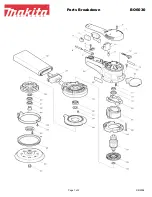
Page 13
For technical questions, please call 1-800-444-3353.
Item 98895
SAFET
y
Op
ERA
TION
M
AINTENAN
c
E
SETU
p
Troubleshooting
problem
possible causes
Likely Solutions
Decreased
output
1. Not enough air pressure and/
or air flow.
2. Obstructed Trigger.
3. Incorrect lubrication or
not enough lubrication.
4. Blocked air inlet screen
(if equipped).
5. Air leaking from loose housing.
6. Mechanism contaminated.
7. Vane wear or damage.
1. Check for loose connections and make
sure that air supply is providing enough
air flow (CFM) at required pressure
(PSI) to the tool’s air inlet.
Do not
exceed maximum air pressure.
2. Clean around Trigger to
ensure free movement.
3. Lubricate using air tool oil
according to directions.
4. Clean air inlet screen of buildup.
5. Make sure housing is properly
assembled and tight.
6. Have qualified technician
clean and lubricate mechanism. Install
in-line filter in air supply as stated
in
Air Supply Setup
on page 7.
7. Replace all vanes as set.
Severe air
leakage.
(Slight air
leakage
is normal,
especially on
older tools.)
1. Cross-threaded housing
components.
2. Loose housing.
3. Damaged valve or housing.
4. Dirty, worn or damaged valve.
1. Check for incorrect alignment
and uneven gaps. If cross-
threaded, disassemble and replace
damaged parts before use.
2. Tighten housing assembly. If
housing cannot tighten properly,
internal parts may be misaligned.
3. Replace damaged components.
4. Clean or replace valve assembly.
Housing
heats during
use.
1. Incorrect lubrication or
not enough lubrication.
2. Worn parts.
1. Lubricate using air tool oil
according to directions.
2. Have qualified technician inspect internal
mechanism and replace parts as needed.
Follow all safety precautions whenever diagnosing or servicing the tool.
Disconnect air supply before service.
Summary of Contents for 98895
Page 1: ......


































